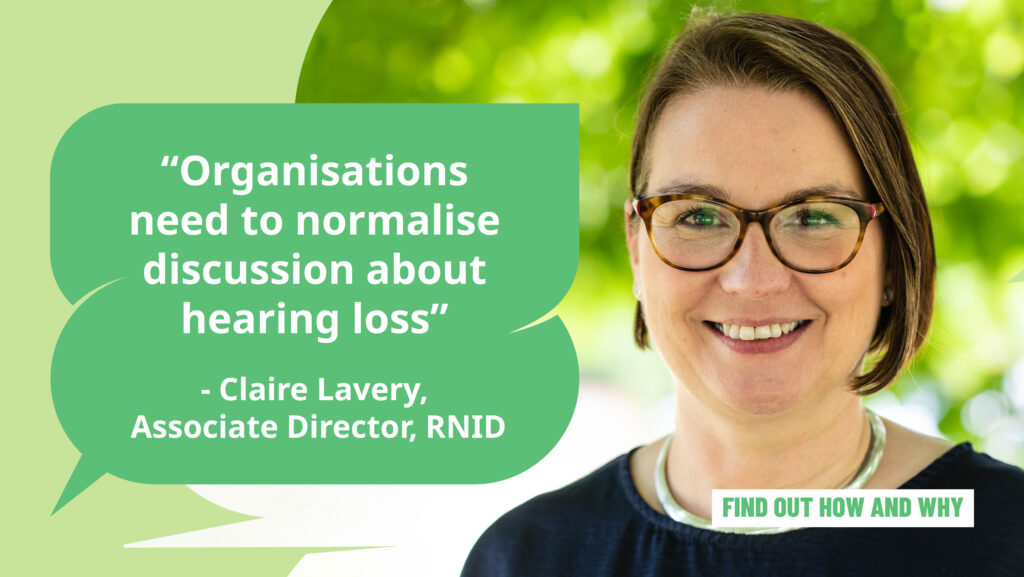
At the beginning of 2023 we launched our new report, which shared insight from employers and recommendations from us about how employers can become more inclusive for staff members who are deaf, have hearing loss or tinnitus.
In our first of a series of deep dives on the report, we break down each of our four recommendations with Claire Lavery, Associate Director for Employment. First up, we look into disclosing your hearing loss at work.
Coping mechanisms
1 in 8 adults of working age have some form of hearing loss, whether they know it or not. A gradual decline in your hearing can be hard to detect, as you are not aware of the sounds you are missing. This gradual change leads to people creating a range of coping mechanisms to manage communication every day, including at work.
Even for people who have taken action to address their hearing loss (for example, by seeking a diagnosis and being prescribed an assistive hearing device, like a hearing aid) might only gradually accept it. For example, they may avoid wearing their hearing aid or disguise it.
What’s the reason for not disclosing?
Over half of people with hearing loss do not disclose it to their employer, their manager or their colleagues. This is often because:
- they feel embarrassed about it,
- they feel that they may be perceived or treated differently by the people around them,
- and they worry it will impact negatively on their job prospects [1].
These worries are not unfounded and much more work needs to be done to tackle stigma and challenge misconceptions around hearing loss especially in the workplace.
However, if you keep your hearing loss a secret at work you are missing out on the support you are entitled to, which could help you do your job more effectively and enjoy your working life to the full.
What do employers say?
Employers have told us that disability disclosure rates in their organisations are lower than the prevalence figures suggest they should be, and that hearing loss usually does not feature at all.
Organisations use disclosure information to measure the diversity and inclusion needs of their workforce, and to identify issues they need to address. This data is used to plan actions that organisations can take to improve the working lives of their staff, and ultimately the performance and success of their business.
Disclosure should not be viewed as an isolated activity, where forms are filled in and boxes are ticked and filed away every year.
So what do employers need to do?
Organisations need to normalise discussion about hearing loss, in recognition of how common a condition it is in society. Prevalence rates are set to grow as our population, and our workforce ages – numbers are predicted to reach 14.2million adults in the UK by 2035 [2].
Watch a recording of our event on improving accessibility at work, held in January 2023 at the Google Accessibility Centre on improving accessibility at work.
Wellbeing initiatives and occupational health activities should include a focus on hearing loss, using the opportunities of topical dates such as World Hearing Day (March) and Deaf Awareness Week (May) or Deaf Awareness Month in September to raise awareness.
Employee Resource Groups and internal interest groups can host talks and invite expert speakers and employees with lived experience to share their stories.
Organisations can encourage their employees to take the free online RNID Hearing Check as a quick and easy way to do something positive to look after their hearing health.
By encouraging open discussion on hearing loss at work, people will feel more confident and comfortable to disclose their own needs, and organisations will be better equipped with the information they need to put support in place.
References
- Our Working for change report (2019)
- Facts and figures – RNID
Read the report
Read our report on Hearing loss at work: Employer insights below.
Sign up to our newsletter
Stay informed about how we’re improving access to employment for people who are deaf, have hearing loss or tinnitus by signing up to our newsletter.